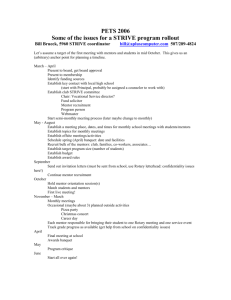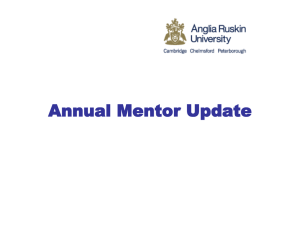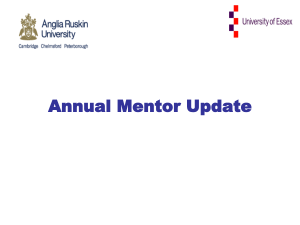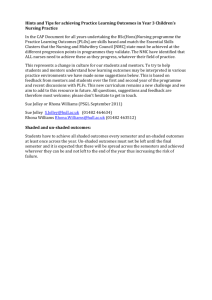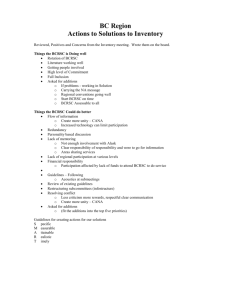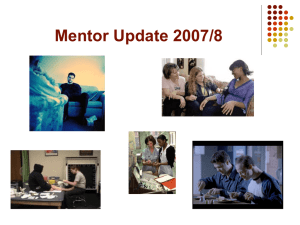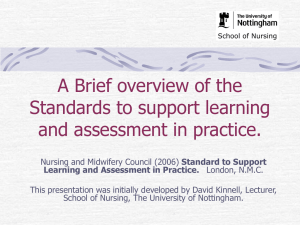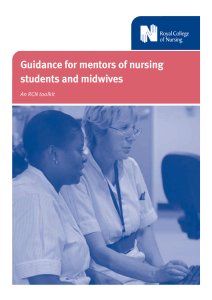Mentor Update - University of York
advertisement
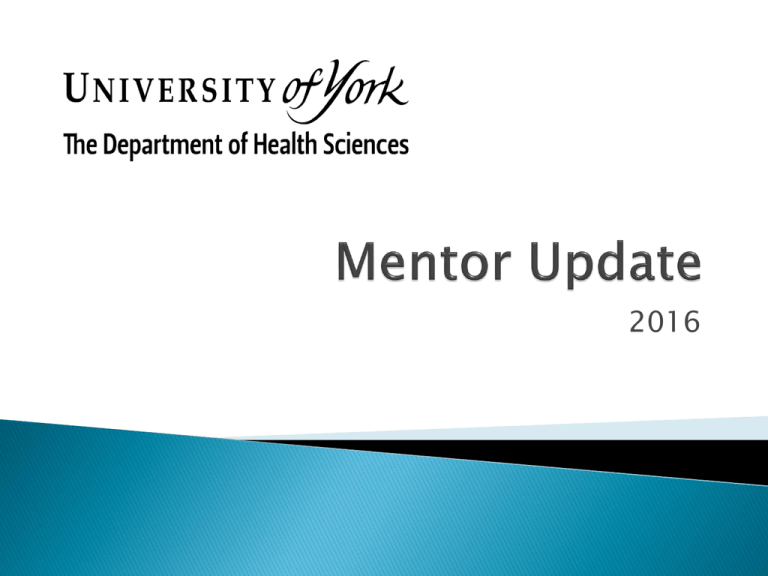
2016 NMC Standards to Support Learning and Assessment In Practice (2008) ‘Initiate and respond to practice development to ensure safe and effective care is achieved and an effective learning environment is maintained’ Attend an annual Mentor Update Mentor a minimum of 2 students every 3 years Complete a review every 3 years with your manager, to appraise your performance as a mentor – triennial review Discuss major changes in nurse education affecting students in practice placement. Explore complex or challenging situations involving students in practice through scenarios Demonstrate how mentors can fulfil their role set by the NMC by keeping up to date between annual updates through the website www.york.ac.uk/healthsciences/practice-edsupport A local mentor register is kept by the Mentor Register Administrator in each Trust or organisation which contains: Names and qualifications of mentors Date of each mentors last update Date of each mentors triennial review Most mentors will receive notification of when they are due an update. From April 2016 the NMC will require evidence of: 450 practice hrs (900 hrs if dual registration as nurse and midwife) 35 hrs of CPD including 20 hrs participatory 5 practice-related feedback accounts 5 written reflective accounts Reflective discussions Health & character declaration Professional indemnity arrangements Confirmation Regional Education Audit Tool (REAT) Every practice placement Every 2 years or earlier when adverse incidents impact on safe and effective learning Carried out in partnership with LEM, link lecturer + senior nurse for education (i.e. PLF/PPF/Clinical lead for education) Highlights areas for potential concern Improves the contact and partnership between education and practice learning Agree on the maximum capacity for all learners for the placement Confirms that resources are available to support learners to achieve their learning outcomes Records action plans, ongoing monitoring, follow up outcomes and deadlines. Recorded on the PPQA website www.healthcareplacements. Mentors must discuss and encourage the student to evaluate the practice experience at final interview Students feedback about their learning experience in practice on the Healthcare Placements website. A hyperlink is built into each Practice Experience workbook in the eportfolio(PebblePad) to make the evaluation easy to find Students get an email reminder on the VLE The LEM in each placement can view the evaluation in real time A process is in place for the Link Lecturer to feed back evaluations Mentors can use the evaluations in their triennial reviews and their re-validation What should a student do if they are concerned about practice they have witnessed? Refer to the ‘Practice Experience Concerns’ page on the Department of Health Science website ‘Activate page’ option Spoke experience tab Supplementary work tab Updated website – www.york.ac.uk/healthsciences/practice-edsupport/pebblepad Forgotten password Medicines Calculations Students must demonstrate in every practice experience that they can calculate medicine dosages without error in practice through: Administration of medications using calculations under supervision Assisting or discussing with service users or carers their medicine administration calculations Scenario or simulation of medicines administration calculations Students must be given an opportunity to practice medicines calculations with support from their mentor. E-portfolio Team – Fiona Powling, Jonathan Ayto, Danielle Simpson E-mail dohs-practiceeducationsupport@york.ac.uk Phone 01904 (32)1540 Visit University of York, Seebohm Rowntree building office ATB/025 on the ground floor Based at the University of York, Department of Health Sciences Support for mentors and students in practice placement Allocations of students to practice placements Mentor Preparation Programme Website-www.york.ac.uk/healthsciences/practiceed-support E-mail - dohspracticeeducationsupport@york.ac.uk. NMC requirements are that mentors are competent in the following 8 domains Establishing effective working relationships Facilitation of learning Assessment and accountability Evaluation of learning Creating an environment for learning Context of practice Evidence based practice Leadership
